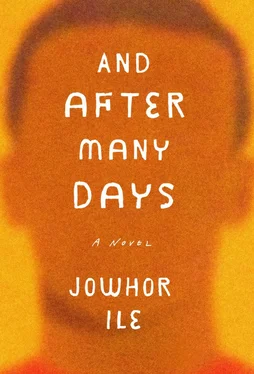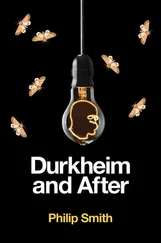Dotun steps into the parlor first and almost collides with Ma, who is coming out to meet them. She is startled and then beams at him, saying several welcomes, touching him by the shoulders, and asking how he is. The Utus have never been a family of huggers or kissers, but Ma falls into Bibi’s arms once she sees her, and Bibi wraps her arms around her, too, and it looks as if they will remain so forever.
—
The next morning at the funeral home, the undertaker leaves them alone in the room and shuts the door. Ma picked the casket herself. It is nothing flashy, just dark polished wood. The inside is padded with red velvet, and there are silver handles on the sides and the lid.
They have waited many years for an answer, and one has finally arrived, dry and diminished, resting inside the wooden box before them, and not one of them in the room knows how to approach the coffin. Ajie feels it’s his place to take the lead; he steps forward to the casket and opens it. When Ma draws close, he holds her hand while Bibi looks in from the other side of the casket. He holds Ma’s hand tight but can still feel the tremor running through it. These bones formed inside her, Ajie thinks. Bibi is the one who has received training over the past seven years on how to handle a human body. She must have spent enough time seeing how the human body can go wrong, how it can turn against itself, how it heals, grows, rots, and what it looks like once the flesh has fallen away. It is Bibi who leans close and touches Paul. Ma has informed the undertakers that they would prefer to arrange what is left of the body themselves.
—
“Lock the gate,” Ma goes outside to tell Ismaila after they get home. “If anyone comes, tell them we are not available. They can come back next week.”
“Yes, madam,” Ismaila says.
Ma joins everyone else in the parlor and sits down. Her face is still puffy and damp, her hands still tremble. Her eyes are welling up with tears again. Bibi’s face is turned toward Dotun, who has pulled his chair back a little bit.
“Whatever Paul went out for that day,” Ma continues, “it’s fine. I have settled it with my God. I mean, he was a child, and maybe he just wanted to go out and see. What I’m saying is that I don’t think he would want us to sit and mourn.” Dotun is nodding gravely and looking at Ma as she speaks. Ajie looks at Bibi and can’t read her at all — her eyes look tired but placid.
Ajie picks up a newspaper and goes to sit in the dining area. It is left to Dotun to initiate a conversation. He is mourning with this grieving family, but he also wants to take their minds off things.
“How is the work going?” he asks Ma. “Bibi said you have been working on a book about plants.”
“What?” Ma asks, looking like she’s been startled out of sleep.
“The book you are writing.”
“Yes, yes. It’s a scrapbook. I’ve been collecting some plant samples,” she says. “They are all probably going to go extinct from the area in a few years.” Her face comes alive. “I have a friend at the University of Port Harcourt who is typing it up and converting the pictures to electronic files.”
Ajie props the newspaper before him. How should he read it? He flips past a story about a Briton who was kidnapped by gunmen who are now demanding a ransom. He skims through the business page and reads an interview of a man who began the first online shopping business in the country, and it is all talk of markets and huge potential and challenges.
“Do you have a title for it yet?” Dotun keeps on.
“I was hoping to get suggestions from these ones.” Ma gestures toward her children. “The title I have is a little long: Ferns and Fauna of the Orashi Plain.”
“I like it,” Bibi says.
“Ma, that’s a very good title,” Paul says, and Ajie turns around to look at him, but Paul is not there. Paul is dead, and what is left of him is in a casket at a funeral home near St. John’s.
Apart from Dotun, who is sitting in the armchair, everything else in the parlor looks exactly the same as when they were children. Ma has returned the family photographs to the wall. She took them all down years ago, after Paul disappeared and Bendic passed away. Now she has replaced the family portrait. Her wedding photo is right below the wall clock. They are standing in front of the St. Luke’s Cathedral in Ede. Ma is dressed in an ivory satin dress and Bendic is wearing a gray suit. A white flower is pinned to the lapel of his suit.
Paul, Bibi, and Ajie are in a photograph hanging in the dining area. Bibi has a small frown on her face. There was something phenomenal about her rage when she was about eight or nine years old. It whipped about for what seemed just over a moment until she snapped and double-slapped you in the face, but here she is now, a recently qualified doctor, collected, her cornrows neat and sheeny.
In the picture, Paul is smiling and ready for the camera. He is looking at Bendic, who is standing outside the frame, telling Ajie to adjust his collar. Ajie looks away from the photo and back at the newspaper before him. He suddenly realizes he is gasping for breath and silently whooping. He puts his head down, and his tears free-fall into the pages and smudge the black print. He stands up, walks into the kitchen, and turns the tap on.
When he returns to the living room, he says, “I think I will go to Ogibah tomorrow, Ma. So I get there a day before you all to get things ready. You haven’t been to the house for a while now. Besides, I want to check out what they’ve done about the grave.”
“I wanted you to be in the car that’s taking your brother.”
“I know, but someone needs to be there to make sure everything is in place.”
“It’s true,” Ma says. Then she warns Ajie to be careful in Ogibah. “Things aren’t the way they used to be.” Disputes are no longer settled with raised voices in a meeting. People no longer write strongly worded petitions to voice their dissent. If you disagree with someone these days, you simply go over to the person’s house with your face unmasked and shoot him. OYF has split into warring factions, and the body count is on a steep rise.
—
The bike speeds past the church and comes to a halt as it reaches the house. Ajie gets off and hands the okada man some cash and waits for his change.
“The people wey get here no dey come home again,” the man says to him as he rifles through his pockets for change.
Ajie wants to say something in Ogba so the bike man stops taking him for a stranger. He wants to tell the man to mind his own business, but he doesn’t. He just smiles and waits for his change. He imagines the man’s reaction if he speaks in Ogba. First surprise that he speaks the language at all, and then that he speaks it well. He would want to know who Ajie is, and Ajie is in no mood to be fawned over. He collects his change from the bike man and turns to leave.
“I am Ofuma by name.” The man is relentless. Ajie accepts the challenge but plays it his own way — he won’t be forced to introduce himself. The paint of the house is peeling and the roofing sheets are rotten and exposed in parts. It is midday, and a kit of pigeons squawk and fly out of a gap on the roof.
“Oga Ofuma, safe journey,” Ajie says to the bike man and walks toward the house, his bag heavy and swaying from his shoulders. He walks beneath the eaves of the house and then looks back at the motorcycle as it makes its way past the church, past the fruit tree by the road, lost in the distance.
Bendic’s grave is to the right side of the quadrangle, and beside it, on the left, is the one made for Paul.
Once Ajie has put his things away, he goes over to Nne Nta’s house to greet her and stays only long enough to tell her everyone is well and that Ma and the others will arrive the next morning, before giving an excuse to leave to attend to an urgent matter.
Читать дальше












